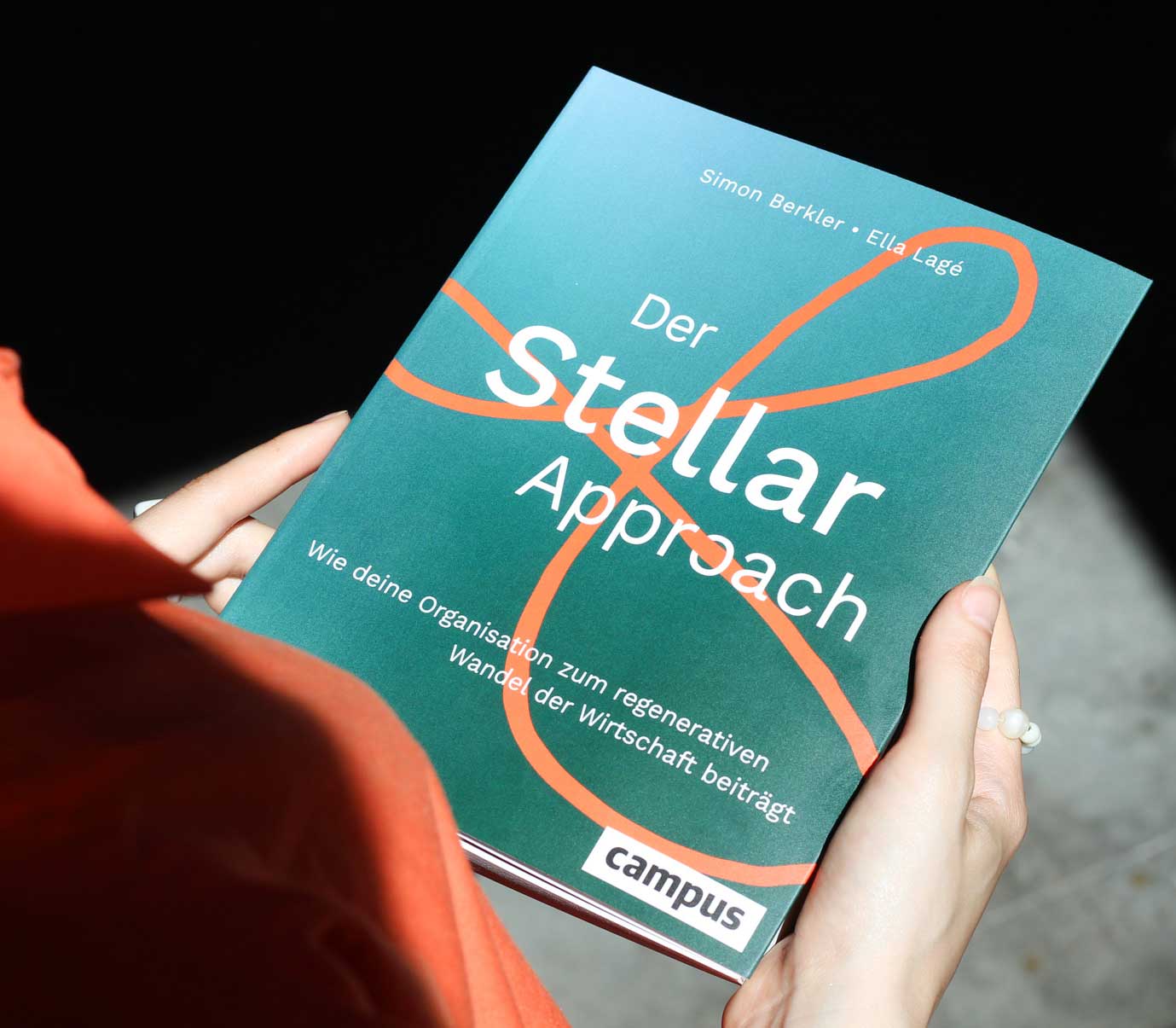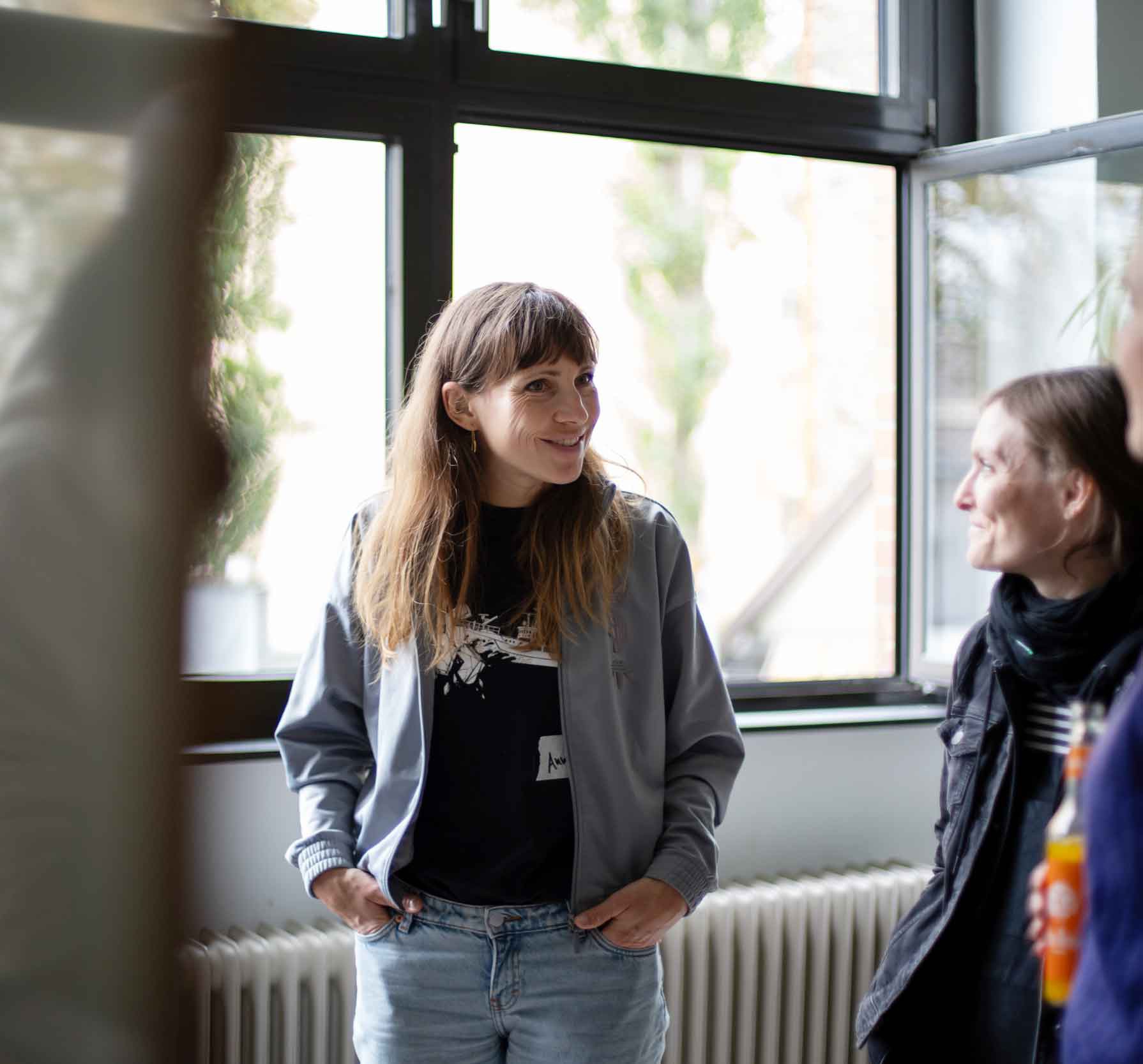
The Stellar Approach is a team-based development program that drives sustainable and regenerative transformation within organizations. Step by step, regenerative practices are integrated into the operational work and culture of organizations.
With the transformation design of the Stellar Approach, we have created a program that brings clarity and structure to a vast undertaking while ensuring openness for individual adaptation.
To successfully design a regenerative transformation, one needs fundamental transformational know-how, which plays a crucial role in all major change processes. Additionally, there are specific work streams required for sustainable and regenerative transformation. The exact form of the transformation architecture can only be answered on a case-by-case basis. However, there are several components that consistently appear on the path to becoming a regenerative organization, which we will briefly explain here.
First and foremost, a detailed clarification of objectives with the stakeholder is conducted to plan a meaningful transformation architecture using the Stellar Approach.
Another significant aspect of this phase is examining the impacts of activities within the organization, often known as materiality. This includes particularly the materiality analysis and potentially necessary baseline assessments. Key questions in this context include: Which business activities affect the environment, climate, or well-being of employees? What emissions are generated and to what extent? Where does the organization currently stand and which indicators are used for measurement?
The results of the materiality analysis serve as an important foundation for other work packages such as formulating the organization's ambition, setting transformation goals, or evolving business models.
In large transformation architectures involving multiple work streams, we work with central steering teams. Depending on the organization and project scope, these teams may have various responsibilities, but the following set of responsibilities is commonly anchored in the steering team:
- Monitors the architecture and coordinates the work streams.
- Responsible for adjustments and iterations of the architecture along the way.
- Incorporates additional expertise where necessary.
- Ensures regular pit stops or retrospectives where process learnings can be integrated.
- Keeps an eye on various stakeholders of the process and plans necessary interventions.
In the "Strategic Alignment" work area, we consolidate four central elements that ensure alignment and coherence at a higher level: Ambition, Purpose, Narrative, and Embedding in Governance.
Based on the materiality analysis and strategic goals, social and ecological priority areas are identified that are of particular importance to the organization. These focus areas may align with Stellar Principles or regenerative models such as the Doughnut Model. Within these focus areas, specific goals should be defined to be achieved within a specified timeframe.
Effective management of our actions can only be achieved through continuous measurement of goal attainment. Suitable indicators need to be established for each goal. If a baseline assessment was not conducted during the analysis phase, it should be integrated into the overarching strategy to better quantify the distance yet to be covered. Such a baseline assessment may also be necessary to finalize adjustments to goals regarding timeframe or contribution.

On 360 lovingly designed pages, we present to you the Stellar Approach in detail. Includes 23 exercises to get you started right away.
Stellar Team Journeys are at the heart of the Stellar Approach. Functional teams now go through the 3 modules of the Stellar Approach, learning to apply regenerative practices to their unique collaborative styles.
Determining the exact right time in the overall transformation to start with (pilot) teams cannot be answered universally. In some transformation processes, it's advisable to first clarify strategic ambition, overarching goals, and metrics to provide teams with guidance for their Stellar Journeys. However, in many processes, it's also very beneficial to start the process with pilot teams to quickly achieve initial actionable results and learn from these for the broader process.
A Stellar Journey typically lasts about three months. Depending on the overall size of the organization, multiple teams embark on their journeys slightly staggered. Often, experiences from Team 1 lead to specific adjustments that can be incorporated into subsequent Stellar Journeys for Team 2 and beyond.
Regenerative transformation processes that involve large parts of the organization require the commitment and support of the leadership level. In addition to the formats for strategic alignment described in this chapter, we therefore recommend starting the Stellar Team Journeys with the leadership teams. This ensures that the leadership teams are well-informed, can effectively steer the overall process, and have early opportunities to shape the Stellar content.
To ensure the continuous implementation of Stellar routines, we need proficient facilitators in every team. They ensure that exchange and meeting routines are practiced effectively and that the sprint backlog is managed smoothly. Therefore, we complement Stellar Team Journeys with specialized training in facilitation. Typically, we gather individuals from different teams into cohorts to minimize training efforts.
Another central component of regenerative transformation is the adaptation or evolution of business models. Such developments can partially occur within Stellar team processes, such as through sprint projects. However, in many transformation processes, it is beneficial to integrate this area as a separate innovation project within the transformation architecture.
As in all change processes, communication plays a central role. Internally, it's crucial to clearly convey the narrative and purpose of the transformation and to promote communication between teams and work streams. Therefore, the communication perspective should be represented in program management.
Externally, communication aims to convey the regenerative transformation journey to stakeholders, with transparency, sincerity, and integrity being crucial.

In a joint hour, we focus on your specific challenges and determine the next steps that make sense for your sustainability transformation.
You can direct your project inquiries directly to Ella from the Stellar Team.

At TheDive, we constantly create new things.
Stay up to date with our newsletter!
At TheDive, we constantly create new things.
Stay up to date with our newsletter!



